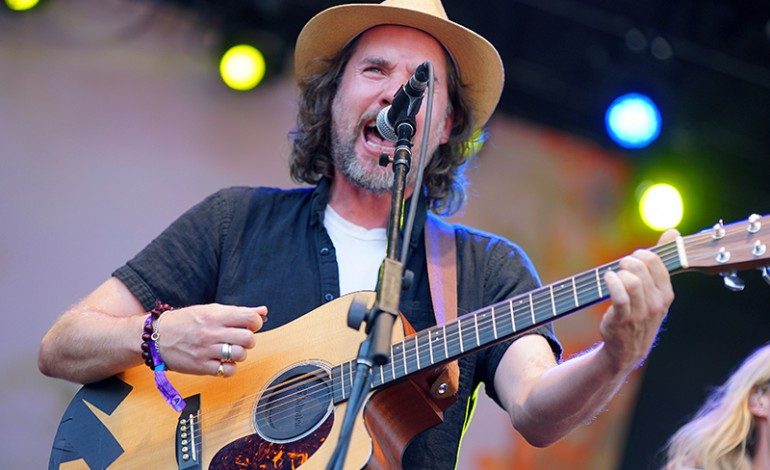

In a new interview with mxdwn, Kevin Drew of Broken Social Scene discusses the music production app Endlesss he used to write his new solo album Influences, turning to younger generations for inspiration, shutting up during the George Floyd uprisings and reconnecting to the same creative sparks that fueled Broken Social Scene’s debut album over 20 years ago. Drew released Influences July 16 under the name K. D. A. P. on ARTS & CRAFTS.
mxdwn: How are you? Are you excited for the new album?
Kevin Drew: I am. You know, I’m 44, so it’s a different world than when I was putting out records before. But, I’m putting them out; I’m putting this one out, first time, in seven years because I made it. And I used to make records for friends, for buds, for peers, people that we would experiment with how many records we could buy each week that would one-up each other in the idea of mind-blowing this of production, the band or whatever. Especially with 96 and 2000, it was the greatest era to go and buy albums because there was so much innovation going on, and so much unheard approach to jazz or hip-hop or even, not so much rock and roll, but, you know, the whole trip-hop scene and instrumental scene and just, it was wild. Production was something there was, you know, a lot of producers out there pushing the boundaries of how to get their sound. So here we are now, and I put a record out that sort of touches upon that. And, yeah, I feel like I’m making records for my friends again.
mxdwn: Yeah, along those lines of great producers of the past, you said Brian Eno was a big influence on this album.
KD: I mean, that’s what the biographer wrote. I’m influenced by, you know, Godrich, John McEntire. It’s endless for me. These were all. There were just so many people that you’re raised on. I think when you’re a kid, Eno is the first one you go through where you’re like, ‘where is this?’
mxdwn: You said this album is, in some ways, the result of your lockdown when you were in London. So I was wondering where these songs first emerged and where they came from? What drew you to make this kind of more slow-down instrumental music during the lockdown?
KD: Well, instrumental music is where I got started, soundtracks to where I’ve lived. I wasn’t stuck in London. I actually flew out there during a fucked up time where we didn’t know what was going on. But I was following my heart to go be with a very, very lovely person who I love extremely. That sort of grounded me for what I thought was going to be maybe a couple of weeks. And I just stayed out there for a few months, because when we went out to the English countryside, I felt very safe there within the times of not knowing what was going on, and of course, very privileged and very fortunate to have that availability of safety they are for me. I have lots of family out there, and I have history up there. So it is like a second home to me, England. It was there where I discovered the application Endlesss with three S’s. It was there that I got into that application. It was there that I suddenly found myself making these long, elaborate compositions through looping and going back and forth from beats to key changes and time signatures, and really diving into what was a studio in my hand because it was my phone. And I had never ever embraced anything like that, let alone used it and have results from something like that. So I was quite excited, like a kid, you know, like a teenager, which for me, it’s quite a long way away. So to get youthful butterflies guiding you through something that you’re not focused on, you’re not doing it for any other reason than just to be in that moment creating music. I was honored. I was honored that I had that ability by this app through this heartbeat coming together being out there. It all just seemed to align to the best of the ability that it could, and that’s where I’m at.
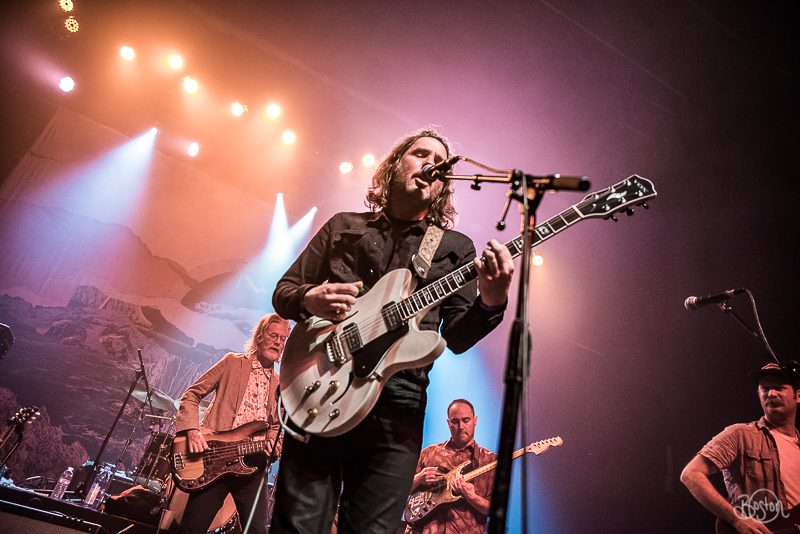

Photo Credit: Boston Lynn Schulz
mxdwn: When I was just trying to find like anything I could of recent videos and stuff of you I saw that you did a graduation speech for the class of ’21 grads—
KD: Is that out?
mxdwn: Yeah, it was on YouTube somewhere. I was trying to find anything I could about you as recent as possible.
KD: What? I didn’t know that.
mxdwn: Yeah, it was hidden away there somewhere.
KD: How did it go over?
mxdwn: I thought it was great! You know, sharing wisdom and life advice. And I was also reminded of how in the visualizer music video for “Slinfold Loop,” there are those moments where the screen flashes with mantras like, “Mistakes are the best teacher” and “Avoid misguided self-help.” Now, 20 years out from the beginning of Broken Social Scene, like you said, you’ve already made it. Do you see yourself now as a kind of mentor or a guide for younger artists and younger people coming up below you?
KD: Yeah, I wouldn’t say a mentor. I’m here for information if people want to ask my opinion, which will only ever be my opinion. I had a lovely friend coin the videos that are coming out as “eye therapy.” I’m just doing what is out there; I’m just showing a reflection of how in social media we’re constantly bombarded with, ‘This is what you should do. This is how you should feel, this is how you got to live, this is how you’ll have yourself.’ A lot of it’s great, a lot of it’s garbage, a lot of it’s filled with, you know, pure intention and a lot of it’s distorted. And the whole aspect of how I wanted to approach it was, it’s a marketing campaign, where they will always take you away from you if they have the opportunity to do that. We’re at a time where, you know, we have such imbalance and such divide in our society. From the class system, right down to how we live as human beings and how we exchange our hellos. And it’s become a battle that is really breeding into our subconsciousness and sort of attacks the anxiety. Now, I can’t speak for your age; I’m not sure what you guys are feeling. I do have a very, very close friend of mine who is your age. And, you know, I check in with him a bunch and just sort of see what’s going on from the perspective of the youth because for me, I’m really into that. I want to see what you are all going to do and how you guys are approaching these times. It’s educational to me. So as you say, ‘Am I a mentor to those coming up?.’ I’m actually looking to them to be a mentor to me so that I can continue going. That was a long way of getting to that answer.
mxdwn: Like you’ve touched on already, Influences is a product of the lockdowns. I was wondering if there’s something that you are trying to say about the pandemic and about the lockdown period with this album? How is it a result of the lockdown, but also what is it trying to say about that time?
KD: I’m not out here to try to say anything. In fact, it was sort of a “shut the fuck up time,” especially with the uprising and everything that was going on a year ago and is continuing today. Even doing these interviews is a little bit on the hypocrisy side. You don’t really need to hear from me. But within that aspect of trying to push this album that I just made, and I need to market myself in my words and my sentences and get press around it so that people can find it, it is just a moment of a soundtrack. I am just building soundtracks. And when you have soundtracks, what’s going on around you is what you have a soundtrack for. All that you’re living through is how you choose what you want to listen to. We have the ultimate jukebox in front of us at all times. Good, bad, confusing, fearful, anxious, amazing, you select that jukebox to how you feel to help you get through to the next level. Because we’re constantly just pushing forward. We’re constantly getting bombarded. And we have to keep pushing forward. So this record, in terms of it being made during a pandemic, it gave me—not purpose, because I don’t turn to art for purpose—but it gave me a definition of how and what I wanted to express through feeling, you know, to get out there and hopefully put in other people’s homes and back pockets and cars and living rooms if they invite me in. There’s an urgency to the claustrophobia and confusion and fearfulness, and then there’s also a very joyous way of saying “we will continue,” and how that looks is up to us.
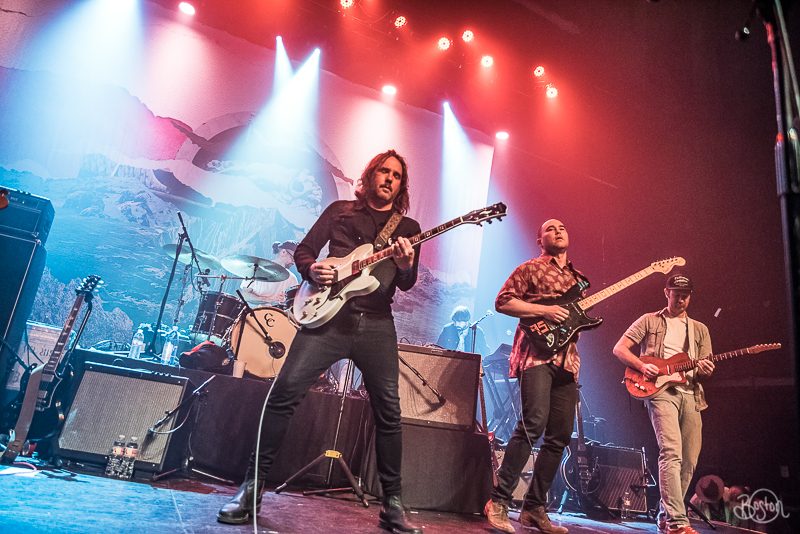

Photo Credit: Boston Lynn Schulz
mxdwn: In some ways, I’m kinda reminded of the debut album for Broken Social Scene where things are a lot more slowed down, spacier stuff, and how this album kind of reflects maybe those same core influences, even though it’s, I would say, a lot different from that sound. Do you feel in that way that you’re returning to your roots or that you’re forging a new direction for yourself creatively?
KD: Both. I feel back home, but I feel back home in general in life right now. So it’s wonderful to go and find out that the next record, the first solo thing I’ve done in seven years, is instrumental. Because that’s how I started. I pretty much started instrumental with my friend Charles Spearin, who’s on this record. I don’t leave home without him. I do feel it’s a full circle, and there’s an honesty to that. We will talk about the app I made it on, Endlesss with three S’s; it gave me the availability to just sort of express myself and have my own intuition and ideas and how I wanted to create the melodies and the beats. I still heard myself within sounds that so many wonderful people within their company and their programming created. I didn’t want to hide from them. I didn’t want to say, “here’s my album,” and redo stuff. I wanted to use their sounds; I wanted people to hear how I use their sounds. I’m a big advocate and fighter for music being in more educated programs, prison systems, all kinds of things, where you can have accessibility to programs like this. Because we do live in a time where most of the funding towards art is getting cut left, right and center and not just in the school systems, but in actual artists’ lives as well. So I’m trying to marry the idea that mystery has no place when you know how to drive. And also, mystery has a wonderful place for those who don’t know how to drive. So there’s no better time to learn than now. I don’t know if that made sense, but it felt good.
mxdwn: And then yes, I did want to ask about Endlesss, and I think you’ve kind of covered already the ways that it expanded your creativity, but it’s obviously a very different environment from being in a studio with the full band. Were there any challenges that came out of that and a new kind of recording process?
KD: Well, I worked with a lovely gentleman named Nyles Spencer out of the Bathouse. We’ve done 10 records together now over eight years, and I thought he was going to punch me in the face when I brought this, like, ‘oh, I made this thing on my phone.’ Then I started downloading, and he had to fit with each track. You only get eight tracks, and then, as the song goes, it comes in stacks of these little loops, and you have to put them together. Then, you have to figure out what’s added on top of each track as you expand more and more, and he just literally like, ‘what the fuck is this?’ But we got through it, and we designed it. We then started using the house and the wonderful instruments there and just the analog nature of how we wanted to approach it. So it was pretty wild. And it was cool that we both were looking at each other just saying, ‘well, we’ve never done this before.’ And to say you’ve never done something before is one of the great things in life as you get older. I mean, there’s no age to that, but there is a way where you’ve done stuff so many times. As you get older, you’ve got to skydive to be like, ‘well, I’ve never done this before.’ But to be in a studio and say, ‘wow, man, I’ve never done this before,’ that’s an achievement. So I think Nyles and I got pretty excited once we started rolling and figuring out what we were doing by getting all my songs into Pro Tools, into the computer, into the house, live drummer, piano, acoustic guitars, using the wind, using the doorways, using the stairwells. It started to really create this excitement in our blood that was undeniable. So yeah, Endlesss was definitely where I wrote it all. I have a wonderful relationship with them. I reached out to them, and we have been forming a great relationship. I don’t have any stock. I’m not paid by them at all; I just thank them for what they did and how, in that time, I was able to have a studio in my hand.
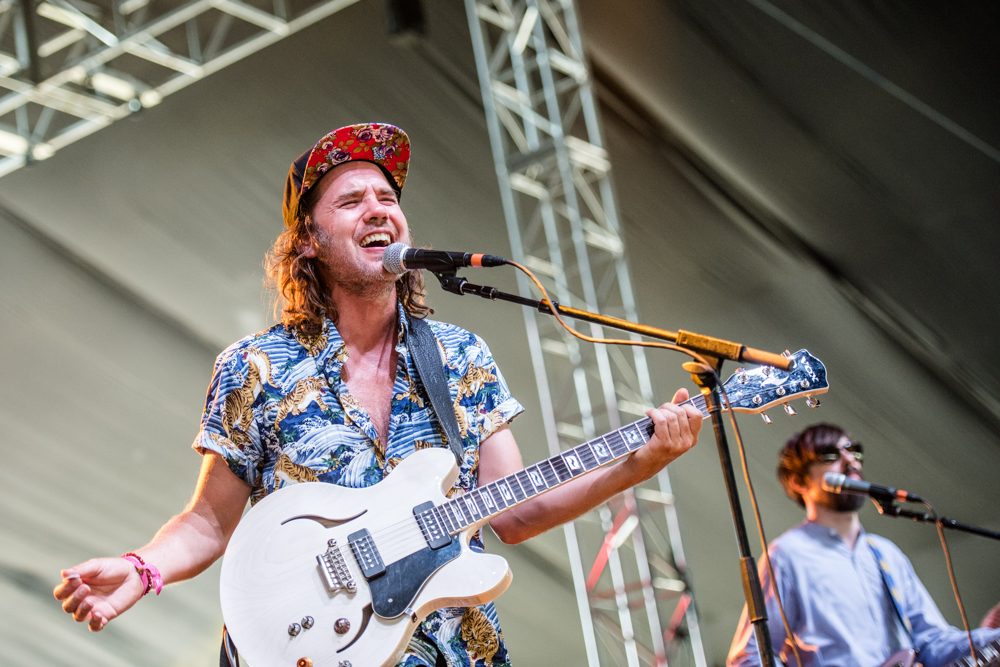

Photo Credit: Sharon Alagna
mxdwn: I always wonder about groups like Broken Social Scene, where it’s a larger collective of musicians, how do you decide what is going to be part of your solo project, and what’s going to go into that larger, collective work with Brendan and Feist and all of them? How does the process differ when you’re making those two different types of albums?
KD: I think with Social Scene, we tried to do ground up. It’s been all different kinds of ways over each record. I thought the last time we did it because everybody was involved, including Feist and Emily and Amy and Lisa, we were able to get a little bit of everybody on everything. On the last record, I sort of was just hosting. I was kind of hanging out and making sure that everybody was happy and getting stuff that they wanted on it. I’ve never written something and said, ‘I’m gonna keep that.’ I think what’s so important is that you don’t do that. Whatever comes through you in the moment, you try to not save it for anything. Actually, that’s a really great quote from Gord Downie, which is, ‘Use it up, use it all up.’ And what he’s meaning is like don’t save it for anything. If you have something, you should act on it because you don’t know. And it’s not to say you could die tomorrow. You could, and why would you want to hold on to something that is in the moment of now. It’s sort of illegal to the spiritual aspects of how you want to live. And so, for me, everything that’s happening is usually a momentary creation. I’m not a big sit-around, write a song, work on it for months, then bring it to the studio and the band. I more just do it from the ground up because that’s where my creativity really comes from. It comes from impulse. So I will not pick up an instrument for a very long time because I don’t need to pick it up to fill my time. I need to pick it up when the impulse is there to pick it up, when there is some sort of urgency inside of me that says, ‘go, you got a song.’ And that’s just been the way that it’s been for me, and if I try any other way, I’m just sitting in a land of limbo, wondering, you know, why I have one foot in concrete and one foot in a puddle? It doesn’t make sense.
mxdwn: Something I talk about a lot with other bands and artists I’ve interviewed is how you make this product that you’re really happy with, and it’s finally done, and then you send it to the label, and it takes like a year for it to actually come out. So I always wonder, by the time an album actually comes out, have you already kind of moved on from that period? Are you already thinking of new sounds and new stuff you’re working on?
KD: I’ve made two records, two albums with two different artists since this. This record was done at the end of November, mastered the second week of January, waited for vinyl because of the backup with the pandemic. And it’s very fucking difficult to get back to where you were when you were creating it. And that’s why so many musicians are like, ‘it has to come out now.’ They’re right because there’s an urgency to it. You can go through Bandcamp; you can actually just put it up on the streams if you want something distributed. It’s all there for the taking if you want it, but when you actually go through the system of ‘let’s go, let’s get some press, let’s get some vinyl,’ it really slows down because they need to slow it down. Because they need to plan the thing out and make sure that all the expectations are in line and all the goals are in line. And I understand that obviously owning the label over the last 20 years. It makes a lot of sense, but yes, sometimes you sit with stuff for so long before it comes out, and how do you not move on? I mean, it’s tough to say in terms of love, but it’s tough to hold on to. So much of love is letting go, you know. I think the truth to what you do is that aspect of you’ve got to let it go. I’m not sure if waiting around to put something out is extremely healthy. But at the same time, you do need to practice patience in this lifetime. And you do need to understand that if you’re going to work with a team and work with a village, that it’s not about you. It’s about the others around you. And that’s a maturity that has to live inside of you when you’re playing the game.
mxdwn: Hopefully, you’re not in the same place creatively that you were a year ago because you’re finding new things to do.
KD: Yeah.
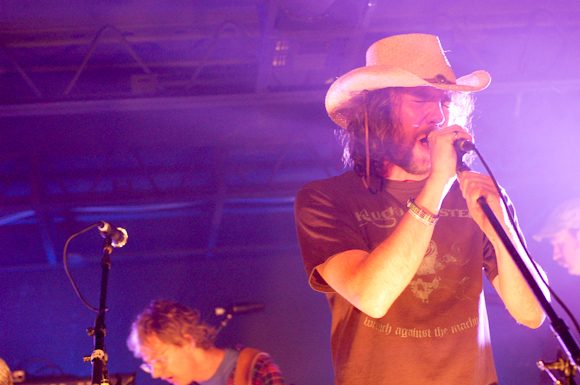

Photo Credit: Raymond Flotat
mxdwn: I remember around the time when Hug of Thunder was coming out, you were pretty open about the stress and anxiety that you face creating music and also more broadly, so I was wondering how Influences is placed in that journey? It seems to me, a very introspective, almost like a meditative album. So I was wondering how it kind of stands in that personal journey if that’s not too personal a question to ask.
KD: No, it’s okay. Everything’s personal, it’s fine. If it’s not personal, it’s not worth it. It’s different periods in your life, and I’ve actually never been happier. I think it’s just because you’ve got to accept where you’re at, who you are and what you’re doing. And there was a lot happening around Hug of Thunder, personally, professionally, spiritually. And there were a lot of challenges that I was quite embarrassed about how I handled in the aspect of I didn’t really know what I was doing anymore and in the day-to-day aspect of feeling comfortable. So when you go out and do these interviews, there’s this mental health egotistical part of me that thinks I should share my struggles so that people know that I’m struggling. And I think it sometimes lands and it sometimes doesn’t. I never want to use, you know, confusion and anxiety and hurt as a marketing campaign. But you do know that there are people out there that are surrounded by those three words I just said. So as an artist, you always want to try to make people not feel alone. It’s kind of your goal if that is what you’re creating for. For me, that is what I’m creating for. I’m creating soundtracks to people’s lives, and I think that you’ve got to relate to the struggle so that you’re allowed to sit at the table. And with this album, as I said, with everything that was going on last summer, the uprising that was happening to the repositioning of privilege, and the real uncomfortable aspect of ‘look at your shit,’ I knew that singing was just not something I wanted to do and it wasn’t an option. I wasn’t looking to make a record. It was this app, Endlesss, that made me start writing again. Once I started to hear that I had so much to sort of melodically say, I went with it. But I went with it on the basis of I know it’s a crazy, fearful, confusing time, and I know anxiety is always around the corner, and so is darkness. But there was a love that I have and had and will continue to have that just sort of whisked me through. And all I try to do when I do these interviews, which I don’t do often anymore, I’m not out there, I try not to clog any airwaves —not even to say that I have the power or opportunity to clog many airwaves. But I’m just trying to give that backrub to the times of now because they are difficult. And if I raise my hand and say anything, I say, ‘yeah, I get it,’ and also, ‘No, I don’t understand that pain. Explain it to me, and I will try to help.’ And those are the two things that I find myself doing right now. Do I feel like a mentor to young kids? No, I’m turning to young kids to be a mentor to me. I want to learn, and I want to know how to continue and how to embrace and how to be compassionate in 2021. I want to know how to, you know, embrace all the terms and the new ways of living. I want to neurologically reset my brain so that I can be a man of compassion walking around, in not only my city but this world. And the work that I do, I want to try to get to everybody. I don’t want any boundaries; I don’t want any divides. I don’t want to say, ‘if you’re into this, you can’t listen to this,’ or ‘if you’re into that, you can’t listen to this.’ I want to invite everybody into the room. Because I think that it’s very important to understand those around you, you have to be in the room with them. And that’s what the greatest thing about live music is. And it’s the reason we made a decision to not really get too political with Social Scene; we wanted to bring people together and not fucking divide them. We all have our own opinions. We all have who we vote for and what we believe. But we wanted those two hours to be a safe place so that people could see how they interacted with each other when they all loved this thing that was in front of them. And to wrap this up, it’s very important, now more than ever, that we see that nothing’s changed. Yet, there’s all this change just fucking fighting to come forward. But if we don’t stick with it, someone’s gonna make another billion dollars off it. And someone’s going to get a job at Google for it. And someone’s going to, you know, get arrested for it. And then the movement will just keep remaining in a box because of the powers that be. They don’t want you to be a free thinker. They just don’t. And they never fuckin have. You got a last question for me?
mxdwn: Yeah, with the album a few days away, is there anything you want people to have in mind when they go into listening to it for the first time?
KD: Just know that I’m grateful that you’re listening, honestly. Life’s just a choose your own adventure, put it on, choose your own adventure.
mxdwn: Great. Thank you so much.
KD: I thank you very much, man. I loved your questions, too.
mxdwn: Thank you. Broken Social Scene was just such a huge influence for me and my friends growing up playing music together, so it’s really amazing. Thank you so much for taking the time to do this.
KD: Really? So you were one years old when we put out the first record? That’s so wild to me. I really appreciate you and your friends. Tell your friends, man, that I can speak for the band when I say we appreciate it. We love when we find out there’s, you know, young folk checking us out because it’s the only way that longevity really happens. Because, you know, a lot of people can’t go out to shows when they have kids and bills and all these things. So anytime that we can get to the younger generation, it’s a huge achievement for us. So thank your buddies for me. I love it, man.
Featured Image Photo Credit: Brett Padelford
